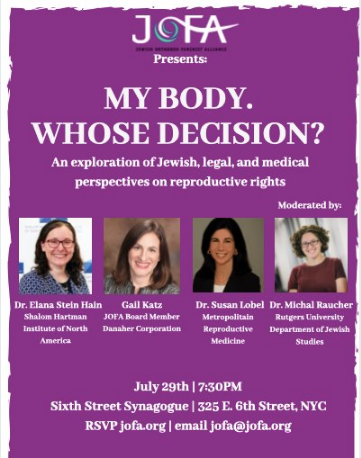
Does Judaism Permit Abortion? Depends Who You Ask.
Some interpretations of Jewish law take a rather utilitarian stance on the matter of abortion: We should do whatever it takes to maintain and expand the Jewish population. Thus, if a pregnancy poses any threat to a person’s survival, their personhood takes priority over the partial personhood of their fetus. But some say that under any other circumstances, termination is wrong. According to Lobel, abortion is an “unfortunate” response to the “privilege of pregnancy.” Lobel posited the most conservative perspective of the panelists, which, moderator Professor Michal Raucher reasoned, is because she is “in the business of making babies.” However, in an interview, Lobel further explained, “I look upon every Jewish child I help to create as a tribute to those murdered in the Shoah and a stand against those past and present who seek to destroy the Jewish people.” Thus the act of bearing children, according to Lobel, not only fulfills halacha, but also seeks to undo what has been done to the Jewish people. Thus, her discomfort with non-medically necessary abortion, is not unfounded. Other panelists however, more readily considered the complexities and individual realities surrounding the issue.
Stein Hain noted that the ambiguity in Talmudic recourse on this matter may be attributed in part to the vast changes in our society since the Talmud was written. Indeed, it is impossible to know how the original (male) Jewish scholars might have approached the subject, although given what we know about the social status of women at the time, any sort of consensus would likely be outdated, anyway.
Raucher shared, on a more personal note, her own struggles with pregnancy, miscarriage, and birth control. Her intention, she said, was to illustrate the need for “sensitivity and awareness” in conversations of reproductive health. In other words, we must be cognizant and respectful of individual experiences. The single parent who already has many children and a full-time job. The teenager who has not been provided with an adequate sex education. The adult who simply does not wish to be a parent. There is no singular conclusion that can be drawn in the context of such a deeply personal question, nor is there anyone who is qualified to draw such a conclusion for anyone else.
Inevitably, the personal is political, which Katz demonstrated as she provided her legal perspective. She primarily described the connections between Jewish and U.S. constitutional law, calling for the end to the isolation of Jewish communities from American society. She claimed that the majority of (observant) Jews’ participation in U.S. politics has typically been in search of exceptions in government restrictions, on the basis of religious freedom. But Katz believes it is important for Jewish Americans to participate in U.S. politics and government, in order to seek protection from discrimination. She noted, “As a minority religion, [we should look to] the bigger picture.”
From a theological approach, Stein Hain posited, “We are not a religion that believes life begins at conception.” Such a statement importantly reaffirms that the subject of abortion is one we should––and need to––discuss. In response to Lobel’s concerns about her feeling that some people don’t value pregnancy, Raucher contended, “Just because you don’t want a pregnancy doesn’t mean you’re cavalier about abortion.” In other words, being pro-choice does not necessarily mean one is pro-abortion; it simply means that all pregnant people should have the option to terminate if it is the most sensible choice for them. And just as some Jews may push back on the infringement of religious freedom, bodily autonomy is also a worthy and crucial freedom to fight for.
One audience-member challenged the panelists to acknowledge the infrequently discussed issue of gender identity as it pertains to reproductive health. The participant asked, “How can we relate this conversation to non-women?” To this, Stein Hain added, “And where are the dads?” These questions reveal the common misinterpretation of reproductive health as a “women’s issue.” We know it is not. Reproductive health affects everyone. Many trans and nonbinary folks can get pregnant and require reproductive health education and services. And since conception requires the participation of two individuals, the panelists agreed, we are still missing a significant chunk of the conversation. But all were optimistic that this conversation will continue to become more inclusive, and that discussions like this one are paramount to pushing it along.
Arielle Silver-Willner is an intern at Lilith. She graduated from Connecticut College in 2018 and lives in Brooklyn, NY. When not in the Lilith office, she nannies and writes fiction.



